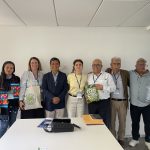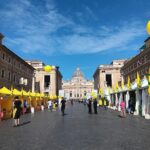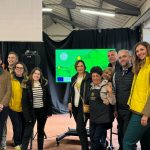With the MAMI (Mediterranean and Africa Markets Initiative) project, after Alexandria and Nairobi, a new space for meeting and socialising with zero-km products is born.
A market is not just a place to buy, but a space for meeting, dialogue, exchange and community. At such a complex time from a geopolitical point of view, opening a farmers’ market in Tripoli, Lebanon, also means building a bridge of peace: creating a space where people, cultures and stories intertwine in the name of solidarity and hope.
It is with this spirit that today, at the King Fahed Public Garden, ‘Urban Farmers’ was inaugurated under the Patronage of the Lebanese Minister of Agriculture H.E Dr Nizar Hani , the first real farmers‘ market in the city of Tripoli, another historic step towards the construction of a network of farmers’ markets between the Mediterranean area and Africa. A project that was born not only to respond to economic and food needs, but to regenerate trust, promote sustainability and social inclusion, restoring dignity to agricultural work and creating deep bonds between producers and citizens.
The market, which will take place every Saturday from 9 a.m. to 2 p.m., is part of the Mediterranean and African Markets Initiative (MAMI-Farmers Markets), financed by the Italian Ministry of Foreign Affairs and International Cooperation and implemented by CIHEAM Bari, in collaboration with the World Farmers Markets Coalition and Coldiretti’s Campagna Amica Foundation in collaboration with the Ministry of Agriculture.
After the successful experiences in Alexandria and Nairobi, the one in Tripoli is the third opening of an urban farmers’ market, with next developments already underway in Tunis, in addition to the opening of new markets in the cities already involved. A growing network actively involving Egypt, Tunisia, Lebanon and Kenya, with the aim of building a sustainable, direct and inclusive agricultural model, rooted in the territory but open to international dialogue.
Inspired by the Italian Campagna Amica model, the market in Tripoli hosts more than 30 local farmers, who offer fresh, quality products: fruit, vegetables, bread, gastronomic specialties, honey, meat, tea, cereals, pasta, flowers and handicrafts. An authentic offer that allows citizens to buy directly from producers, supporting the local economy and enhancing the link between city and country.
During the opening ceremony, the Minister of Agriculture emphasized that the farmers’ market is more than just a space for selling produce—it is a direct extension of agricultural activity from field to consumer, without intermediaries. It serves as an effective tool to support family farming, promote decentralized marketing, stimulate the local economy, and build a relationship of trust, quality, and sustainability between farmers and consumers.
He confirmed this initiative as a key step toward a fairer and more efficient marketing system—one that enables farmers, both women and men, to market their products with dignity and profitability, improves their livelihoods, enhances national food security, and encourages consumption of fresh local produce.
Minister Hani has also reiterated the Ministry’s commitment to supporting and expanding this initiative by Providing technical support to participating farmers; he emphasized that, the opening of this Farmer’s market today stands as a successful model of collaboration between international and local partners. It affirms the potential of both rural and urban communities to thrive when given the right opportunities and support.
The Italian Ambassador to Lebanon, Fabrizio Marcelli, underlined: ‘This market represents not only an important tool for local development, but also a concrete example of how sustainable agriculture can be a driver of inclusion, innovation and responsible tourism. Italy is proud to support, through its Cooperation, initiatives like this that strengthen communities, enhance rural heritage and promote fair and environmentally friendly food models’.
Jean Charles Khairallah, farmer and president of the Lebanon Farmers Markets Coalition, said: ‘This market represents much more than an economic opportunity for us. It is a sign of hope: to be able to continue to live off our land, nourish our communities and find unity through local, fair and good food, which unites and does not divide.’
Carmelo Troccoli, director of the Campagna Amica Foundation and the World Farmers Markets Coalition, is satisfied: ‘Being in Tripoli today for this inauguration is a source of great emotion. It was not to be taken for granted to succeed in achieving this in such a difficult context. But right here, where the war has hit hard, the farmers’ market becomes a symbol of resistance, rebirth, and community. Farmers ‘markets are extraordinary tools of inclusion, identity and resilience: through them we can build local food models that unite people and strengthen the fabric of society.’
Biagio Di Terlizzi, Deputy Director of CIHEAM Bari, said: “Tripoli Farmers Market, inaugurated and opened following the two in Egypt and Kenya, is the third market our project has established in an African country. This aligns with the collective efforts of all Italian cooperation partners involved in the Mattei Plan for Africa, supporting the development and socio-economic growth of our African partners.”
With the opening of the market in Tripoli, MAMI takes a further step towards a global network of farmers’ markets that promote peace, sustainability, inclusion, and local development, focusing on food as a tool for dialogue and a shared future.






